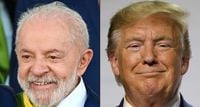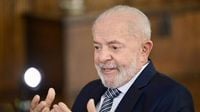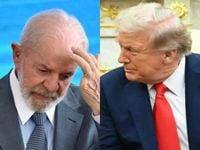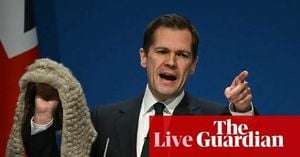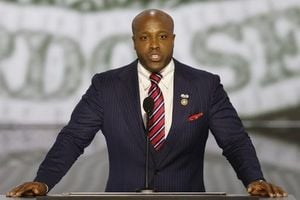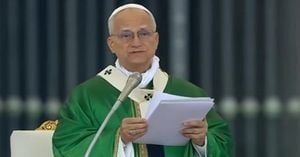On Monday, October 6, 2025, Brazilian President Luiz Inácio Lula da Silva and U.S. President Donald Trump took a significant step toward easing months of diplomatic tension, holding a 30-minute video call described by both sides as “friendly” and “very good.” The conversation, which followed a period marked by escalating trade disputes and political discord, may signal the beginning of a thaw in relations that have reached their lowest ebb in decades.
According to official statements from both governments, the leaders discussed a wide range of issues, with economic and trade relations front and center. Trump, who had previously hiked tariffs on Brazilian goods from 10% to 50% in response to what he called a “witch hunt” against his political ally and former Brazilian president Jair Bolsonaro, acknowledged the call on his Truth Social platform, saying, “We will be having further discussions, and will get together in the not-too-distant future, both in Brazil and the United States.”
Lula, for his part, used the opportunity to press Trump for the removal of the punitive tariffs and the lifting of sanctions targeting Brazilian officials. “We are very optimistic that we will move toward a win-win situation in this relationship,” Brazil’s Vice-President Geraldo Alckmin said, emphasizing the positive tone of the call and revealing that both presidents exchanged personal phone numbers to facilitate direct communication (as reported by AFP and SCMP).
The tariffs, imposed over the summer of 2025, have taken a heavy toll on Brazilian exports. According to Brazilian trade data released this week, exports to the United States fell by 20.3% in September compared to the previous year, while imports from the U.S. actually rose by 14.3%. The hardest-hit sectors include beef, coffee, and sugar—major staples of Brazil’s export economy. Coffee exports to the U.S. have plummeted by as much as 70%, forcing American roasters to seek pricier alternatives and pushing up coffee prices for U.S. consumers, who have long relied on Brazil for about a third of their supply (Reuters and SCMP).
The roots of this bilateral rift are deeply political. Trump’s decision to slap tariffs on Brazilian goods and sanction top officials—including Supreme Court Justice Alexandre de Moraes, who oversaw Bolsonaro’s trial—came in direct response to the conviction and 27-year prison sentence handed down to Bolsonaro for his involvement in a failed coup attempt following his 2022 electoral defeat to Lula. Trump, in both public statements and his UN speech, has repeatedly denounced the Brazilian legal proceedings as a “witch hunt,” drawing parallels to his own legal troubles in the aftermath of the January 6, 2021, Capitol insurrection (Voz US).
Diplomatic friction has been further fueled by sharp rhetoric on both sides. At the United Nations General Assembly in late September, Lula condemned what he called “unacceptable” attacks on the independence of Brazil’s judiciary, while Trump accused the Brazilian government of “censorship,” “repression,” and “judicial corruption.” Despite these public clashes, the two leaders managed to find some common ground during a brief encounter on the sidelines of the UN meeting, which Trump later described as evidence of “excellent chemistry.” Behind the scenes, however, diplomats revealed that this meeting was the result of a carefully orchestrated “diplomatic operation,” not mere serendipity (Estadão).
During their Monday call, Lula floated the idea of an in-person meeting at the upcoming Association of Southeast Asian Nations (ASEAN) summit in Malaysia, scheduled for next month. He also reiterated his invitation for Trump to attend the COP-30 climate conference in Belem, Brazil, in November, and expressed his own willingness to travel to the United States. Both leaders agreed that further face-to-face discussions would be essential to repairing the frayed relationship, with Trump indicating openness to meetings in both countries (Reuters).
In a sign of renewed diplomatic engagement, Trump designated Secretary of State Marco Rubio to lead tariff negotiations with Brazilian officials, including Vice President Alckmin, Foreign Minister Mauro Vieira, and Finance Minister Fernando Haddad. The move was welcomed by the Brazilian side, which has repeatedly expressed frustration over what Lula described as “no one to talk to” in Washington when it came to resolving trade disputes (AFP).
Private sector players have also played a behind-the-scenes role in nudging the two governments toward reconciliation. Brazilian billionaire Joesley Batista, head of beef giant JBS, reportedly met with Trump at the White House to advocate for improved trade relations. Additionally, aircraft manufacturer Embraer and other business interests have applied pressure on both sides, recognizing that continued hostilities threaten billions in cross-border commerce (AFP).
Despite the optimism expressed by both governments, the underlying political differences remain stark. Lula and Trump are on opposite sides of many global issues, including multilateralism, international trade rules, and climate change. Their recent phone call, however, suggests a pragmatic willingness to set aside ideological divides—at least temporarily—in favor of mutual economic benefit. “The call went even better than we expected,” Vice-President Alckmin noted, reflecting cautious hope for progress.
Brazil’s strategy has also involved diversifying its export markets, with September trade data showing significant growth in shipments to China, India, Singapore, Argentina, Peru, and Panama. Still, the U.S. remains a critical trading partner, and both governments appear keen to avoid a prolonged standoff that could damage their economies and global standing (AFP).
The sanctions imposed by the U.S. have extended beyond tariffs. In addition to targeting Justice de Moraes under the Magnitsky Act, the Trump administration revoked visas for six high-ranking Brazilian officials, including Solicitor-General Jorge Messias. These moves have added another layer of complexity to the already fraught relationship, prompting Lula to use his UN platform to call for respect for Brazil’s sovereignty and legal institutions (Reuters).
Looking ahead, all eyes are on the proposed meetings in Malaysia and Belem, as well as ongoing negotiations between the two countries’ economic teams. The stakes are high—not just for the leaders themselves, but for businesses, workers, and consumers on both sides of the equator. Whether this week’s “friendly” call marks a genuine turning point or merely a temporary pause in hostilities remains to be seen. But for now, at least, there is a glimmer of hope that dialogue and compromise may triumph over confrontation.
As the world watches, the next chapter in U.S.-Brazil relations will be shaped not just by presidential personalities, but by the practical realities of trade, diplomacy, and the enduring ties that bind the two largest democracies in the Americas.
